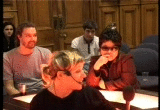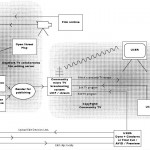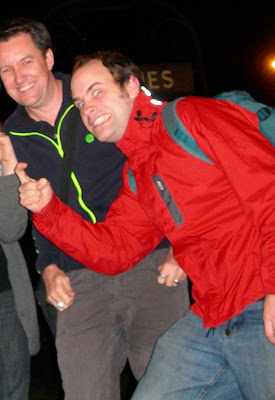In Spring 2008, NODE.London is calling a seasonal gathering of media art, showing how London is budding with fresh exhibitions, discussions, musical events and participatory projects.
This website will soon be filling with an ongoing programme from Spring 2008. Until then, you can browse the archive of the first NODE.London season of media arts in March 2006.
NODE.London is open to any person or group who wants to help spread media art and related activity around London and beyond! If you would like to get involved, please check the NODE.London wiki and come to one of our regular meetings and introduce yourself.
The next Layer
This one day workshop “from taxi to praxi and back again” uncovers and examines some of the challenges and opportunities faced when creative artistic practice is undertaking research. Independent artists and free and open source software developers have made more rapid advances than those working within the more traditionally minded arts and humanities departments in academia. The challenge is now to find ways of re-embedding useful aspects of free and open source methodologies in academic practice based arts and technology research. How do we incorporate and negotiate research in those areas of work which are strongly inter- and trans-disciplinary? The aim of the workshop is to address and discuss some of the generic, rather than discipline-specific, challenges of undertaking practice-based research within academia. The workshop will draw on open and collaborative (FLOSS) methodologies by proposing and discussing a diverse range of taxonomies and practices thus “from taxi to praxi and back again”. http://www.thenextlayer.org (collaboration between Armin Medosch & Adnan Hadzi)
Greenwich.TV ?
For people interested in brainstorming on a converging broadband/broadcast medium, webtv – greenwich tv?
This event is a follow up session of the disclosures roundtable discussion on TV looking at “…organisational principles of openness in contemporary cultural production, by focusing on openness in the public sphere, taking participation and community TV making its starting point.”
New input to the questions asked at disclosures?:
Disclosures roundtable “… will ask people around the table to consider the different approaches to participation presented in each of the projects. From this we will reflect on how we, as cultural producers, can facilitate sustainable opportunities for open participation. The topics that will be of interest are civic reach, censorship and methods of broadcast.”
see also http://www.gasworks.org.uk/exhibitions/detail.php?id=344
dorkbotswiss
people doing strange things with electricity
dorkbotswiss presentations are meant to be fun, friendly, informal chats. they’re short, just 20-30 minutes, including questions. the standard “artist talk” format (my life history in slides + narration) does not work very well at dorkbotswiss. what does work well is a casual talk about something you’re currently interested in. pretend you’re at a dinner party and someone has just asked you, “so what are you working on?” we encourage people to ask questions during the presentations, rather than always waiting until the end.
about dorkbot.swiss
dorkbot.swiss ist ein alle zwei monate stattfindendes meeting von künstlerInnen (sound/image/movement/ etc…), designerInnen, ingeneurInnen, studentInnen und anderen interessierten, die in schaffung und gestaltung elektronischer kunst ( im weitmöglichsten sinne) involviert sind. jedes dorkbot.swiss meeting präsentiert ein lokales, ein nationales und ein internationales projekt.
die absicht von dorkbot.swiss ist es:
* den künstlerInnen/programmiererInnen/ingeneuerInnen die möglichkeit zu bieten, ihre arbeit anderen künstlerInnen verschiedenster richtungen vorzustellen und mit ihnen zu diskutieren und zu betrachten.
* ein forum für die präsentation neuer art works/ technologien/ software/ hardware zu etablieren
The Open Knowledge Foundation is a not-for-profit organization founded in 2004 with the simple aim of promoting (and protecting) open knowledge. It is our belief that open approaches to the production and distribution of knowledge can deliver far-reaching social and commercial benefits in a variety of areas.
What is Open Knowledge?
Simply put: it is knowledge that is open! To be more specific, by knowledge we mean any kind of content, information or data: genes to geodata, sonnets to statistics. By ‘open’ knowledge we mean knowledge which anyone is free to use, re-use and redistribute without legal, social or technological restriction. For more details and a really precise explanation of what this means see the Open Knowledge Definition.
What We Do
The Foundation exists to promote open knowledge in all ways possible. Central to this is our role as an open and participatory community as well as our position as a hub and partner for existing open knowledge networks. Beyond this we work specifically to:
Running through all of our activities is a strong emphasis on decentralized collaboration. In particular, our primary aim is to help others develop open knowledge rather than doing it ourselves. Of course, that doesn’t mean we don’t develop specific projects (for example Open Shakespeare) but we believe that the future lies in collaboration between a multitude of different groups and that no one group or organisation can, or should try to, “do it all”.
Introduction to Open Knowledge 2008: 1030
Rufus Pollock, Open Knowledge Foundation
Session 1 (1045-1200): Transport and Environment
* Gavin Starks (AMEE and dgen)
* Tom Steinberg (MySociety)
* Dr Muki Haklay (Department of Civil, Environmental and Geomatic Engineering, University College London)
Session 2 (1200-1315): Visualization and Analysis
* Liz Turner
* Gael Varoquaux (Mayavi2 and Scientific Python)
* One other TBC
Session 3 (1415-1530): Education and Academia
* Erik Duval (ARIADNE)
* Lisa Petrides (OER Commons)
* Dr Martin Brett (Cambridge University History Department)
Open Space (1530-1830)
* Contributed (and spontaneous) lightning talks, demos, mini-workshops
Open Media Economics Panel (15:45-16:45)
* Jamie King http://www.stealthisfilm.com
* Joerg Baach http://www.opencoin.org
* Simon Worthington http://www.openmute.org
* Holmes Wilson http://www.getmiro.org
|
Who
|
What
|
|
Jamie King
|
DISPS. Falling broadly under the rubric of Alternative Compensation Systems, DISPS spans four key research areas: Peer to Peer (P2P) distribution, digital fingerprinting, metadata and digital payment mechanisms. However, the project is neither another P2P distribution system, nor another proposed payment system: rather it seeks to build a pathway through which creators of content distributed over P2P networks can receive remuneration for their works.
|
|
Joerg Baach
|
Introducing Open Coin. The opencoin project is about creating tokens that allow anonymous transfers. Using opencoin organisations can run a voucher system, start an alternative currency or could roll out an online payment system. It implements the ‘digicash’ idea as free and opensource software. Opencoin is a system without accounts, so transactions between users cannot be tracked. The software will run on normal computers, webservers and mobile phones. http://opencoin.org
|
|
Simon Worthington
|
More is More. Dev site http://moreismore.net. Dev and support site http://3d.openmute.org. The More is More Network is a web based system for distributing independent media for sale at local outlets and events. Members can also input contact information about their local area; book shops, meetings, gatherings and share this with everybody to help build the distribution network further.
|
|
Holmes Wilson
|
Miro: the free, open source internet tv and video player.
|




